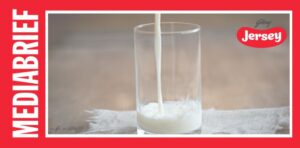
 Prices should be set fair above 40p until the second quarter of 2025 but watch out for the Northern Irish warns dairy analyst Chris Walkland ahead of his regular appearance as part of the Kite/Scottish Dairy Hub seminar tomorrow (13 November)
Prices should be set fair above 40p until the second quarter of 2025 but watch out for the Northern Irish warns dairy analyst Chris Walkland ahead of his regular appearance as part of the Kite/Scottish Dairy Hub seminar tomorrow (13 November)In an exclusive blog for NFU Scotland, Chris writes:
“Dairy commodity prices were on the slide in October and end-product buyers sensed they might be getting a stronger hand to negotiate with. Sellers were still in a strong position, but perhaps not as strong as they were.
“Meanwhile milk volumes, especially in the UK, have been rising at a pace that we have not seen before, further eroding their selling positions. Gains over last year initially were two per cent up… then three per cent higher… and now over four per cent more.
“We have never had such high Autumn milk volumes before, in fact. To put them in context, from 1 January to 30 September, the UK had set new daily milk production records in just nine days – six of them in March, one in May, and two in September.
“But October saw 25 out of the 31 days in the month set new record highs, plus the first two days of November. The levels are extraordinary, and fuelled in their entirety by volumes in Northern Ireland as there have only been four days this year when GB volumes have hit record highs.
“In fact, milk volumes in Northern Ireland are up more than 10 per cent compared to last year. And with some generous winter bonuses to come (aka seasonality) I can’t see volumes dropping off anytime soon!
“It was because of these volumes that I have been saying milk prices will come under pressure in February or March next year. Currently I can see Arla increasing again for December, although not as much as it did in November, and then holding its price for January.
“But by February and March the trading world will have both eyes on the Northern hemisphere flush, dairy sales will have seen their traditional post-Christmas dip, and caution will be the order of the day.
“However, the first Global Dairy Trade (GDT) of November might affect my theory and delay the seasonal downward pressure. That’s because it was a very good GDT indeed – up 4.8 per cent – and EU commodity prices have rallied.
For example, Dutch butter hit a high of €8100/tonne in mid-September. It then dropped to €7440/t in mid-October. But after, the GDT spot sales of butter are now in excess of €8100/t again! I have also seen one trade for immediate delivery of butter reach €8700/t!
“Cream has also set its own record price – in Europe it has sold for €11,000/t! To put that in context, the average cream price since 2020 is €6200/t. In UK terms, which prices cream in £/kg and not €/t, the current price is around £3.10/kg. Our average price since 2020 is £1.90/kg.
“Q1 butter prices are lower than now, as would be expected, and are currently around €7500/t for butter. It is a fantastic price: to put that in context, 2024’s Q1 average was €5600; 2023’s €4800; 2022’s €6150 and 2020’s €3550.
“Against that, though, we’ve got to look at other prices. You can’t make butter without getting skimmed milk powder (SMP), and the price of this isn’t great at €2500/t in Europe and £2100/t in the UK.
“Cheese prices are also holding up well, with some saying it’s the demand for cheese that is the main market driver, despite butter grabbing the headlines with its record prices. Mild cheddar is still at £4300/t in the UK with mozzarella at £3800/t, but under pressure in Europe from rising milk volumes.
“It all means the price prospects are set fair for the early part of 2025, at least.
“Last year at the Kite-Scottish Dairy Hub seminar at AgriScot, I gave the not so good news that there was nothing on the cards to suggest a 40p milk price. And prices didn’t top that threshold on a standard litre until September, so I made the right call there.
Happily, this year, I can stand up tomorrow at AgriScot (13 November) in the far happier position of being able to say I can’t see them dropping below 40p for a few months yet. Probably not until Q2 and the spring flush.
“But when they do, and by how much, will almost certainly depend on those milk volumes… especially those from your fellow farmers in Northern Ireland!” Ends
- The Kite/NFU Scotland Scottish Dairy Hub seminar at AgriScot is to be held at 13.00 upstairs in the main seminar room. The panellists are Richard Thompson (the new Agricultural Supply Chain Adjudicator); Paul Grant, Chair of the Scottish Dairy Growth Board; Paul Dover, UK Agricultural Director of Arla Foods; Alex Jack, dairy farmer, and Chris Walkland, dairy market analyst and journalist.




